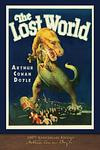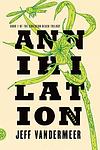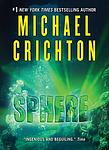The Greatest "Science fiction, Scientists" Books of All Time
Click to learn how this list is calculated.
This list represents a comprehensive and trusted collection of the greatest books. Developed through a specialized algorithm, it brings together 300 'best of' book lists to form a definitive guide to the world's most acclaimed books. For those interested in how these books are chosen, additional details can be found on the rankings page.
Genres
Science fiction is a genre of literature that explores the potential consequences of scientific and other innovations on society and individuals. It often features futuristic or imaginary settings, advanced technologies, and scientific concepts that are not yet fully understood or realized. Science fiction can encompass a wide range of themes, including space exploration, time travel, artificial intelligence, and alternate realities. It is a genre that allows authors to speculate on the future of humanity and the impact of scientific progress on our lives.
The "Scientists" category of books encompasses a wide range of literature that explores the lives, work, and discoveries of scientists across various fields of study. These books may delve into the history of science, biographies of famous scientists, or the latest breakthroughs in scientific research. They may also examine the impact of science on society and the ethical dilemmas that arise from scientific advancements. Overall, the "Scientists" category offers readers a fascinating glimpse into the world of science and the individuals who have shaped our understanding of the natural world.
Countries
Date Range
Reading Statistics
Click the button below to see how many of these books you've read!
Download
If you're interested in downloading this list as a CSV file for use in a spreadsheet application, you can easily do so by clicking the button below. Please note that to ensure a manageable file size and faster download, the CSV will include details for only the first 500 books.
Download-
1. Frankenstein by Mary Shelley
This classic novel tells the story of a young scientist who creates a grotesque but sentient creature in an unorthodox scientific experiment. The scientist, horrified by his creation, abandons it, leading the creature to seek revenge. The novel explores themes of ambition, responsibility, guilt, and the potential consequences of playing God.
-
2. The Invisible Man by H. G. Wells
The book is a gripping science fiction tale about a scientist who discovers a way to make himself invisible. However, the inability to reverse the process leads him into madness and terror. The narrative explores themes of alienation, social responsibility, and the moral implications of scientific advancement. The invisible man's struggle with his condition and society's reaction to his invisibility serve as a critique of humanity's fear and misunderstanding of the unknown.
-
3. The Lost World by Arthur Conan Doyle
"The Lost World" is an adventure novel that follows a group of explorers as they embark on a perilous journey to a remote plateau in South America, where prehistoric creatures still roam. Led by an eccentric professor, the team encounters dangerous dinosaurs, hostile tribes, and treacherous terrain, testing their courage and resilience. As they strive to survive and document their discoveries, the explorers face thrilling encounters and unexpected challenges that push them to their limits. This thrilling tale of exploration and survival is filled with suspense, action, and a sense of wonder as the characters navigate the mysteries of this lost world.
-
4. Kallocain by Karin Boye
This dystopian novel presents a totalitarian world where the government exercises complete control over its citizens' lives, even their thoughts. The protagonist, a loyal soldier, invents a truth serum named Kallocain, which the government uses to extract citizens' innermost secrets. As the story unfolds, the protagonist begins to question the morality of his invention and the regime he serves, leading to a deep personal crisis. The book explores themes of individual freedom, privacy, and the dehumanizing effects of totalitarianism.
-
5. Annihilation by Jeff VanderMeer
In the novel, a team of four women—an anthropologist, a surveyor, a psychologist, and a biologist—embark on an expedition into Area X, a mysterious and remote region cut off from civilization. The area is known for its strange occurrences and the disappearance of previous expedition members. As the team delves deeper into the wild and enigmatic landscape, they encounter bizarre creatures, cryptic signs, and the remnants of a lost civilization. The biologist, serving as the narrator, documents their discoveries and her own personal transformations, driven by the unseen forces of Area X. The novel explores themes of nature, mutation, and the unknown, as the expedition's members confront the limits of knowledge and the consequences of seeking to uncover the inexplicable.
-
6. Exhalation by Ted Chiang
"Exhalation" is a collection of nine science fiction short stories by Ted Chiang that explore various themes such as free will, determinism, artificial intelligence, and the nature of consciousness. Each story presents a unique and thought-provoking concept that challenges the reader's understanding of the world and human existence. The stories range from a society that communicates through scent to a scientist who discovers the secret of time travel. Chiang's writing is insightful, imaginative, and philosophical, making "Exhalation" a must-read for fans of science fiction and speculative fiction.
-
7. Quicksilver by Neal Stephenson
"Quicksilver" by Neal Stephenson is the first book in "The Baroque Cycle" trilogy, set in the late 17th and early 18th centuries. The story follows the life of Daniel Waterhouse, a member of the Royal Society, as he navigates through a world of scientific discoveries, political intrigue, and personal relationships. From the coffeehouses of London to the court of Louis XIV in Versailles, the novel weaves together historical events and fictional characters to create a sprawling epic that explores the birth of modern science and the clash between old and new worldviews.
-
8. Sphere by Michael Crichton
In "Sphere" by Michael Crichton, a team of scientists is sent to investigate a mysterious spacecraft discovered deep underwater. As they explore the alien vessel, they uncover a massive, perfectly spherical object that seems to possess incredible powers and the ability to manipulate reality. With their own fears and hidden desires becoming increasingly dangerous, the team must navigate the psychological and physical challenges of the sphere, questioning their own sanity and the true nature of the enigmatic object.
-
9. The Calcutta Chromosome by Amitav Ghosh
"The Calcutta Chromosome" by Amitav Ghosh is a captivating science fiction novel that intertwines the stories of Antar, a computer programmer in New York, and Murugan, a former employee of the British Indian Medical Service in Calcutta. As Antar delves into the mysterious disappearance of Murugan, he becomes immersed in a complex web of history, science, and conspiracy. The book explores themes of time travel, medical research, and the pursuit of knowledge, taking readers on a thrilling journey through the streets of Calcutta and the depths of the human mind.
Reading Statistics
Click the button below to see how many of these books you've read!
Download
If you're interested in downloading this list as a CSV file for use in a spreadsheet application, you can easily do so by clicking the button below. Please note that to ensure a manageable file size and faster download, the CSV will include details for only the first 500 books.
Download







